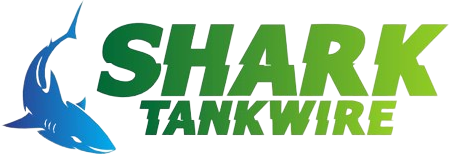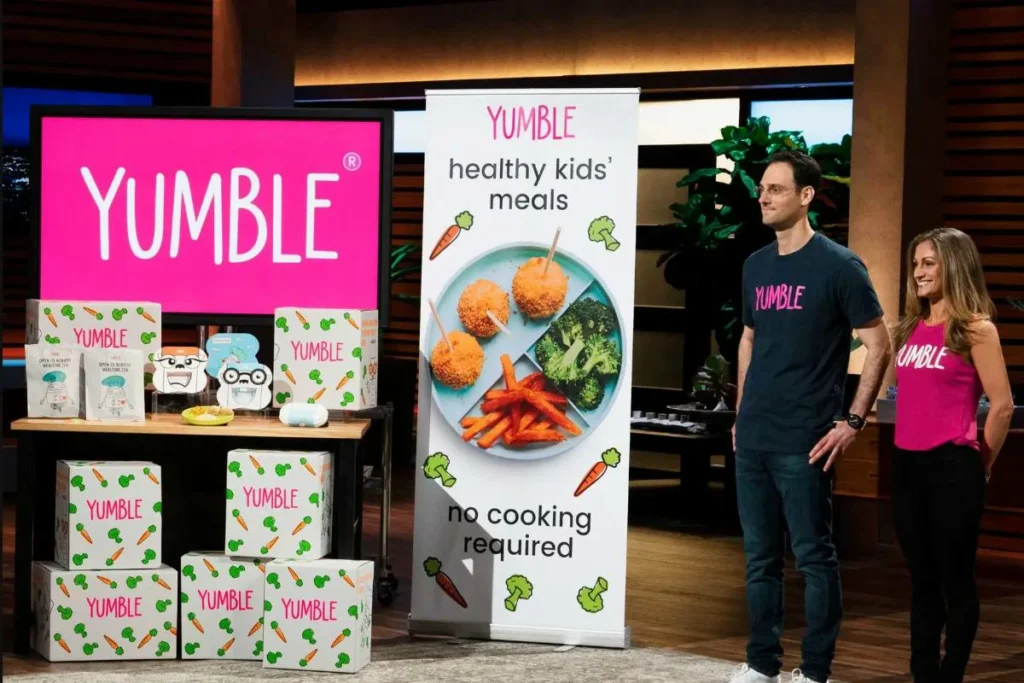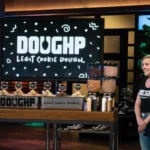What is Yumble and what problem does it solve? Yumble is a pre-made meal delivery service specifically designed for kids. It addresses the common challenge parents face in providing healthy and appealing meals for their children, especially when time is limited and picky eaters are involved. Yumble offers a convenient solution with its nutritious, ready-to-eat meals that cater to various dietary needs and preferences.
Summary
- Yumble is a kid-focused, healthy meal delivery service.
- Founders David and Joanna Parker appeared on Shark Tank Season 10 seeking $500,000 for 4% equity.
- They secured a deal with Bethenny Frankel for $500,000 for 6% equity, but it ultimately fell through.
- Despite raising further capital, Yumble ceased operations in December 2022 and was acquired by Dibz Kidz.
- Dibz Kidz shifted Yumble’s focus from meal subscriptions to pre-packaged snack items.
- Dibz Kidz has also since gone out of business.
Yumble Shark Tank Update | Shark Tank Season 10
Yumble was born out of a common parental struggle: providing healthy, appealing meals for kids. Founders David and Joanna Parker experienced this firsthand with their own three children.
Joanna, tired of the constant battle with picky eaters and the time constraints of preparing nutritious meals, began creating pre-made meals with a healthy twist.
She took classic kid favorites like pizza, mac and cheese, and chicken nuggets, and reimagined them using wholesome ingredients like nutrient-dense vegetables, whole grains, and lean proteins.
Word spread, and soon Joanna was making meals for other families, facing an overwhelming waitlist. This sparked the idea for Yumble, a convenient meal delivery service designed to take the stress out of mealtime for busy parents.
Yumble Shark Tank Season 10 Appearance
Hoping to expand their reach and impact more families, David and Joanna took Yumble to the Shark Tank.
In Season 10, they pitched their kid-friendly meal service to the Sharks, seeking an investment to help them grow their business and bring healthy, convenient meals to children across the country.
Their appearance on the show marked a pivotal moment in Yumble’s journey.
Yumble on Shark Tank
1. The Pitch: Healthy Meals Made Easy
| Entrepreneurs | David and Joanna Parker |
|---|---|
| Business | Yumble: Pre-made meal delivery service for kids |
| Ask | $500,000 for 4% equity |
| Deal | $500,000 for 6% equity (accepted from Bethenny Frankel) |
| Sharks | Mark Cuban, Kevin O’Leary, Lori Greiner, Rohan Oza, Bethenny Frankel (guest) |
| Season – Episode | Season 10, Episode 5 |
| Original Air Date | November 11, 2018 |
| Website | Yumble |
| Key Points of Pitch |
|
| Why Sharks Accepted |
|
2. Shark Tank Offers and Final Deal
The Sharks were impressed with Yumble’s mission, the quality of the food, and the company’s promising growth trajectory.
However, some Sharks expressed concerns about the competitive landscape of the meal delivery market.
- Bethenny Frankel: Offered $500,000 for 15% equity, emphasizing her expertise in the food industry and her potential to serve as a brand spokesperson.
- Rohan Oza and Lori Greiner: Offered $500,000 for 12% equity, with Rohan recognizing the potential for Yumble to disrupt the market and Lori bringing her QVC expertise to the table.
Ultimately, Bethenny Frankel revised her offer to $500,000 for 6% equity, which David and Joanna accepted.
3. Why Bethenny Frankel Invested in Yumble
Bethenny Frankel, a successful entrepreneur and food industry expert, was drawn to Yumble for several reasons:
- Alignment with her brand: As a mother and founder of Skinnygirl, a lifestyle brand focused on healthy living, Bethenny connected with Yumble’s mission to provide nutritious and convenient meals for families.
- Marketing potential: Bethenny saw herself as a natural spokesperson for the brand, leveraging her influence and platform to raise Yumble’s profile.
- Strong business fundamentals: Yumble had demonstrated impressive sales growth and customer retention, indicating a solid foundation for future success.
Bethenny’s investment and involvement signaled a significant vote of confidence in Yumble’s potential to become a leading player in the children’s meal delivery market.
Yumble After Shark Tank
1. The Fate of the Bethenny Frankel Deal
While the Shark Tank episode showed David and Joanna accepting Bethenny Frankel’s offer, the deal ultimately fell through.
The exact reasons behind this weren’t publicly disclosed, but it’s not uncommon for deals made on the show to dissolve during the due diligence phase.
This can happen for various reasons, such as disagreements over valuation, company direction, or unforeseen challenges.
Despite this setback, Yumble continued to operate and secured funding from other investors. This demonstrates the company’s resilience and the underlying strength of its business model, even without the backing of a Shark.
2. Yumble’s Growth and Subsequent Challenges
Following their Shark Tank appearance, Yumble experienced a period of growth, fueled by increased brand awareness and a rising demand for convenient, healthy meal solutions for kids.
They expanded their menu offerings, improved their delivery logistics, and continued to attract new customers.
However, like many businesses in the competitive food delivery sector, Yumble faced challenges. These likely included managing operating costs, maintaining consistent quality, and competing with larger players in the market.
They also introduced “Yumble Up” to address customer feedback regarding portion sizes, offering larger meals for older children.
3. Acquisition by Dibz Kidz and Brand Transformation
In December 2022, Yumble announced it was ceasing operations and selling its assets to Dibz Kidz, another company specializing in kid-focused food solutions. The acquisition marked a significant turning point for the Yumble brand.
Dibz Kidz chose to retain the Yumble name but shifted the business model away from prepared meals.
Instead, they focused on offering subscription packages for pre-packaged snack items, essentially transforming Yumble into a lunchbox snack service.
This move likely aimed to streamline operations, reduce costs, and capitalize on the existing brand recognition of Yumble.
Unfortunately, this strategic shift did not prove successful. Dibz Kidz, operating under the Yumble brand, also ceased operations in early 2024.
This highlights the challenges faced by businesses in the ever-evolving food delivery and subscription service landscape.
What Happened to Dibz Kidz?
Unfortunately, Dibz Kidz, the company that acquired Yumble, also met an untimely end. Despite their initial enthusiasm and plans to revitalize the brand with a focus on pre-packaged snacks, they ceased operations just a few months after taking over.
This suggests that the challenges within the market, such as competition, changing consumer preferences, and operational costs, proved too difficult to overcome.
The quick demise of both Yumble and Dibz Kidz serves as a stark reminder of the volatility of the food industry, especially for startups navigating the complexities of subscription services and ever-evolving consumer demands.
Key Takeaways from Yumble’s Journey
1. Lessons for Food-Based Startups
Yumble’s story offers valuable lessons for aspiring food entrepreneurs:
- Market Validation is Crucial: Even with a great idea, thorough market research and testing are essential to ensure there’s sufficient demand and a viable path to profitability.
- Adaptability is Key: The food industry is constantly changing. Businesses need to be flexible and willing to adapt their strategies to stay ahead of trends and challenges.
- Managing Costs is Essential: Maintaining a close eye on operational costs, including production, packaging, and delivery, is vital for long-term sustainability.
- Competition is Fierce: The food delivery and subscription service market is highly competitive. Startups need to differentiate themselves and offer unique value propositions to stand out.
2. The Impact of Shark Tank Exposure
While the Shark Tank deal didn’t materialize, Yumble undoubtedly benefited from the exposure gained through the show. Appearing on national television increased brand awareness, attracted potential investors, and provided valuable publicity.
This highlights the potential of Shark Tank as a platform for entrepreneurs to gain visibility and accelerate their business growth, even if they don’t secure a deal with the Sharks.
Yumble’s journey, though ultimately ending in closure, provides a valuable case study for entrepreneurs in the food industry. It underscores the importance of adaptability, careful planning, and a strong understanding of market dynamics to navigate the challenges and capitalize on opportunities in this dynamic sector.
FAQs
What was Yumble?
Yumble was a subscription-based meal delivery service specifically designed for kids. They offered pre-made, healthy meals with kid-friendly flavors, aiming to make mealtime easier for busy parents.
Why did Yumble shut down?
While the exact reasons for Yumble’s closure are not publicly known, it likely faced challenges common to many food startups, such as competition, managing costs, and meeting evolving consumer demands.
Did the Shark Tank deal with Bethenny Frankel go through?
No, the deal with Bethenny Frankel ultimately fell through after the show. However, Yumble secured funding from other investors and continued to operate for several years.
What happened to Yumble after it was acquired by Dibz Kidz?
Dibz Kidz shifted Yumble’s focus from prepared meals to pre-packaged snack boxes. Unfortunately, Dibz Kidz also went out of business shortly after.
Was Yumble a success?
Yumble achieved considerable success in its early years, gaining significant brand recognition and attracting a loyal customer base. While it ultimately ceased operations, its journey provides valuable insights for aspiring food entrepreneurs.
The Bottom Line
Yumble’s story is a compelling example of both the potential and the challenges faced by startups in the food industry. Despite its promising start and appearance on Shark Tank, the company ultimately succumbed to the pressures of a competitive market and evolving consumer preferences.
However, Yumble’s legacy serves as a valuable case study for entrepreneurs. It highlights the importance of adaptability, strong financial management, and a deep understanding of the target market. While the Yumble brand may no longer exist, its story continues to offer valuable lessons for those navigating the complexities of the food industry.








